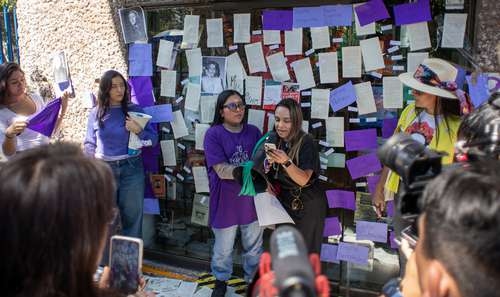They demand the resignation and apology of Paco Ignacio Taibo II

They demand the resignation and apology of Paco Ignacio Taibo II
“In seven years we have fought discrimination against women,” says the director of the FCE
▲ In front of the Fondo de Cultura Económica headquarters in Ajusco, activists protested Paco Ignacio Taibo II's remarks in which he made light of gender quotas. Photo by Sergio Hernández
Eirinet Gómez
La Jornada Newspaper, Wednesday, October 29, 2025, p. 5
A group of activists protested in front of the Fondo de Cultura Económica (FCE) to demand the resignation and public apology of its director, Paco Ignacio Taibo II, after statements in which he made light of the gender quota to justify the inclusion of only seven women in the 25 for 25 collection, which includes 27 poetry titles.
In an interview with La Jornada , Taibo responded: “Tell me what I have to apologize for, for having prepared the 21 for 21 project (published in 2021 and which includes authors from Octavio Paz to Carlos Monsiváis and Elena Poniatowska)? You know what? Let's be serious.”
Regarding the demand for his resignation, he remarked: “So what? How many times have they gone to a mass demonstration to demand your resignation? Let’s be serious. What do you want me to say? That there’s a group that wants me to resign? Well, there has been since we took over the management of the Fund.”
Regarding President Claudia Sheinbaum's proposal, made yesterday during her morning press conference, to publish a collection dedicated to women writers, Taibo affirmed that it will be done, although he cautioned: "We can't release a collection like the one the President proposed overnight; but we will do it, of course, no problem."
The protest began shortly after 10 a.m., when the demonstrators pasted pages from the book Sueños de frontera , by Taibo II, interspersed with the names and photographs of Mexican women writers, while the songs of feminist rapper Rebeca Lane were played on a portable speaker.
On the floor they placed the names of 30 writers, whom they singled out for sexist practices, including Carlos Fuentes, José Revueltas and Salvador Novo.
With this installation behind them, the feminists took up the term "horrible," used by Taibo II in his statements, to list more than one hundred authors, including Natalia Toledo, Elena Poniatowska, Ana Matías Rendón, Guadalupe Nettel, Amparo Dávila, Penélope Córdoba, Pita Amor and Alma Delia Murillo.
“Sexist myopia”
“Her sexist myopia prevents her from seeing the vast number of female authors with potential in Mexico and Latin America. Let’s do her a favor and leave the space to those who actually know how to make public policies and understand that equality benefits us all,” said Diana Luz Vázquez Ruiz, of the Sabina Law Collective.
As part of their demands, in addition to the dismissal of the FCE director, the protesters requested a public apology for his statements and transparency in the selection criteria and processes for the "25 for the 25th" collection, which will be distributed in several Latin American countries. They also demanded accountability regarding the costs of editing, printing, and distribution, as well as payments to the included authors.
Regarding the shipment of copies abroad, they requested information on how many will be sent to other countries and how many will be distributed domestically. They also requested annual reports on public policy initiatives implemented by the Fondo de Cultura Económica (FCE) that incorporate a gender perspective and promote the participation of women writers and readers.
The protesters emphasized the need to establish a free training program for women writers and to require FCE management to attend gender awareness courses. They also requested the publication of an exclusive collection of works by living women writers.
During the demonstration, verses such as " In Defense of the Poets " by Mónica Suárez; " You Know What?, Damn Taibo, You're Right" by Nadja Milena Muñoz; "Untitled Poem " by Diana Chavarri; and "Horrible Poems for Taibo II " were presented, in which the contribution of women in literature and culture was vindicated, and machismo was questioned.
Regarding the demands for transparency in the investment in the collection, Taibo II responded to this newspaper: “Who cares about transparency? There were 15 people and 13 journalists at today’s protest. If you don’t value it, then we’ll all go crazy.”
The protest occurred after Taibo II, during the presentation of the "25 for the 25th" collection at President Claudia Sheinbaum's morning press conference, was questioned by a journalist about why, of the 27 titles included, only seven were by women. In his response, the director of the Fondo de Cultura Económica (FCE) made light of the gender quota:
“If we start with the quota, you say: well, if I know of a book of poems, written by a woman, horribly awful, just because it was written by a woman doesn't mean it deserves to be sent to a community room in the middle of Guanajuato, man. Why do we have to punish them with that book of poetry?”
Moments before the demonstration, in a video posted to the FCE's Instagram account, Taibo II reiterated the opportunities afforded to women at the institution he has led for the past seven years. He emphasized that the book clubs and reading rooms, as well as the booksellers' staff, are headed by women, and that the head and deputy head of the bookstore network in Mexico are both women.
“For seven years, the FCE has maintained a position of combating discrimination against women in all its forms. Machismo is a social disease that must be fought, and we must establish the golden rules of egalitarianism: equal pay for equal work; equal opportunities, prioritizing women under equal conditions to solve an age-old problem we have been carrying for so long.”
From the Editorial Staff
La Jornada Newspaper, Wednesday, October 29, 2025, p. 5
Although he is embroiled in controversy for his derogatory remarks towards female writers, the director of the Fondo de Cultura Económica, Paco Ignacio Taibo II, will remain in his position, confirmed President Claudia Sheinbaum.
–Don't you think it's time to make changes in the management of the Fondo de Cultura Económica?
"No, no, no, not at all. He's a great colleague. We already said that we're going to do a special collection of Mexican women writers; well, Mexican and Latin American women writers," she said during her conference without elaborating further on the subject.
There are 520 million native Spanish speakers worldwide.
Armando G. Tejeda
Correspondent
La Jornada Newspaper, Wednesday, October 29, 2025, p. 5
Madrid. The Spanish language is at its peak, with unprecedented and rising numbers: there are currently 520 million native Spanish speakers worldwide, but the number of potential speakers, including those who speak it as a second or third language, is already 635 million. Although English remains the global language, Spanish is gaining increasing prominence, as are Mandarin Chinese and Hindi, which continue to hold the first and second positions among the languages with the most native speakers on the planet.
The annual report of the Cervantes Institute, Spanish in the World 2025 , confirmed the good moment of our language, with an expansion in countries that do not have Spanish as an official language, such as the United States, Brazil, the United Kingdom, France, Germany and Portugal.
The Cervantes Institute, one of the most important institutions in the promotion of Spanish in the world, presented its yearbook with updated data on the state of this language, including the increase in speakers, as confirmed by Luis García Montero, director of the organization, which in turn depends on the Ministry of Foreign Affairs of the Spanish government; in fact, its head, José Manuel Albares, was present at the presentation, and wrote an article on Spanish and diplomacy.
The report includes several key findings, such as the fact that the native Spanish-speaking community will surpass 500 million speakers for the first time in 2025. This figure places it as the third largest community in the world, behind native speakers of Mandarin Chinese and Hindi. The report highlights that there are approximately 460 million native Spanish speakers in Latin America, where speakers with limited proficiency number around 25 million. Furthermore, one in ten native Spanish speakers resides in non-Spanish-speaking countries, a fact that underscores its importance as a migrant language. The number of potential Spanish speakers outside of Spanish-speaking countries exceeds 120 million, with the European Union as a whole being home to more than 45 million Spanish speakers, in addition to those residing in Spain.
In the presentation, García Montero explained that "through the yearbook we want to reclaim the democratic values implicit in our history and in our present, in the concerns of our language in a polarized world in which we live and in which Western societies suffer the tension of public debate."
Working tour in Mexico
The director of the Cervantes Institute begins a working visit to Mexico today, where he will participate in the ceremony awarding the 2025 Excellence in Humanities Prize to poet Marco Antonio Campos, to be held at the San Lázaro Legislative Palace. He will also participate in the opening ceremony of the Biennial Congress of the Society of Hispanic Poetry of the Renaissance and Baroque periods and will meet with the rector of the National Autonomous University of Mexico (UNAM), Leonardo Lomelí Vargas, to discuss various collaboration agreements between the two institutions.
jornada



